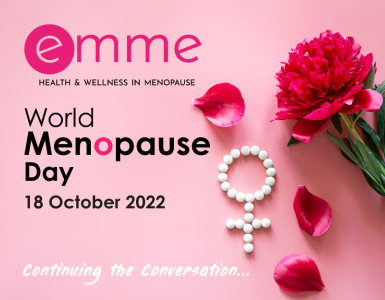Maisie Hill is determined to teach women more about their bodies and what happens as we go through the menopause. Her new book, Perimenopause Power, is loaded with scientific information and engaging anecdotes about this often-taboo subject. Anyone who will experience the menopause (and those who love them) will benefit from reading this brilliant resource.
Here are five things that Maisie Hill’s book explains about ‘the change.’
It can happen much earlier – or later – than you think
While most of us expect the menopause to occur sometime in our 50s, the range is actually much larger. Some women start going through these hormonal changes in their 30s, while it doesn’t happen until their 60s for others.
“The Menopause” is a single day – everything else leading up to it is perimenopause
While we often use the term to refer to the entire process, the menopause is the specific calendar date that marks the first anniversary of your last period. All of the time and symptoms leading up to that day are the perimenopause.
You might not recognise perimenopause as it happens
Progesterone production tapers down slowly over time – your cycles get shorter, you experience spotting, and you have a hard time sleeping. Hill explains that, “because oestrogen and progesterone are two hormones on a see-saw, when progesterone drops, oestrogen goes up.” This boost of oestrogen can cause mood swings, bloating, brain fog, and vaginal dryness.
Healthcare professionals don’t always understand it
Most GPs and specialists don’t understand the ins and outs of perimenopause, nor do they understand the system-wide effects that it can have on your body. In many cases, GPs can misdiagnose perimenopause. Hill writes, “there is a case study in the book where I speak about a client of mine whose GP had been giving her antidepressants instead of giving her HRT (hormone replacement therapy), and she finally demanded it. But she had gone six years not getting any treatment, suffering severe symptoms including intrusive thoughts, and really she just needed oestrogen.” Arm yourself with knowledge and advocate for your perimenopausal healthcare needs.
HRT (Hormone Replacement Therapy) has an oft-undeserved bad reputation
You may have heard that HRT leads to cancers and heart problems, but the science doesn’t bear this out. Hill says, “a lot of people are very put off by the idea of HRT, but it’s far safer than we’ve been led to believe. We’ve had 20 years of scary headlines, saying that it doubles the risk of breast cancer and of cardiovascular disease, but the research that those headlines are referencing was conducted over 20 years ago now, and it was flawed. They used participants that should never have been included in a research trial as they wouldn’t now meet the classification of what would be deemed healthy.”
If you feel like you will benefit from HRT during your menopause, the perimenopause years can be an important window of opportunity. Starting during perimenopause can reduce negative symptoms down the road.
Maisie Hill’s book is called Perimenopause Power: Navigating Your Hormones on the Journey to Menopause (Bloomsbury, £14.99).
Have you read it? Why not leave your thoughts and review below.
















